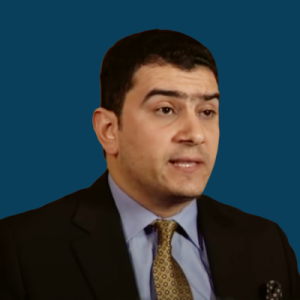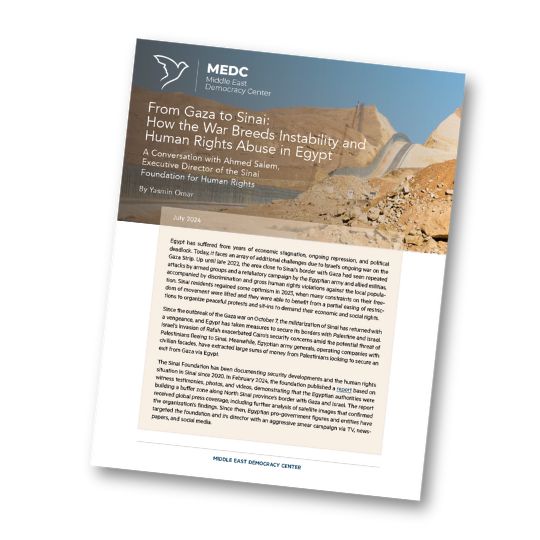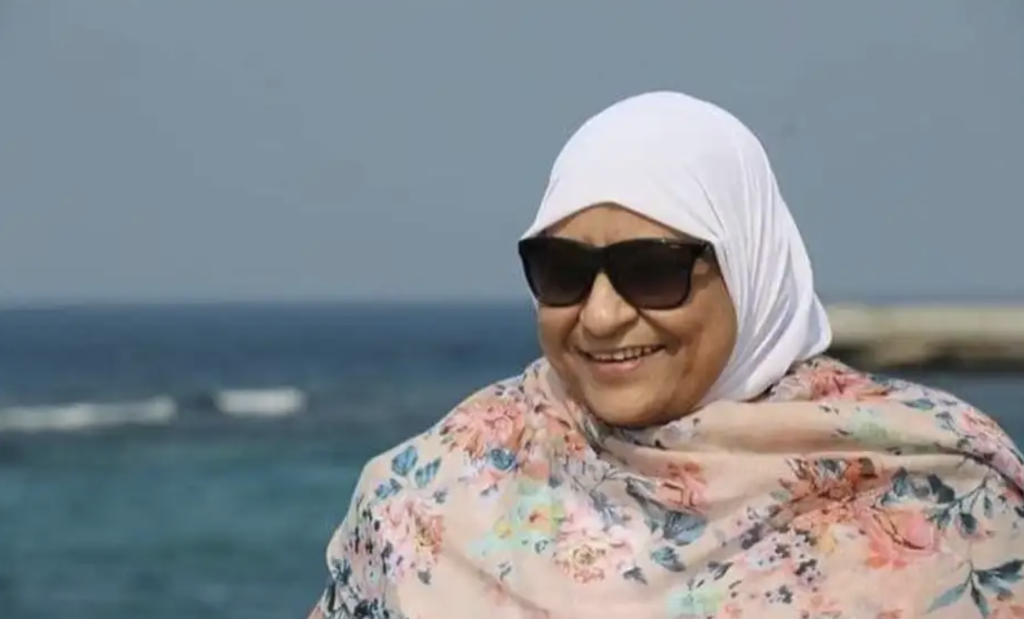Egypt has suffered from years of economic stagnation, ongoing repression, and political deadlock. Today, it faces an array of additional challenges due to Israel’s ongoing war on the Gaza Strip. Up until late 2022, the area close to Sinai’s border with Gaza had seen repeated attacks by armed groups and a retaliatory campaign by the Egyptian army and allied militias, accompanied by discrimination and gross human rights violations against the local population. Sinai residents regained some optimism in 2023, when many constraints on their freedom of movement were lifted and they were able to benefit from a partial easing of restrictions to organize peaceful protests and sit-ins to demand their economic and social rights.
Since the outbreak of the Gaza war on October 7, the militarization of Sinai has returned with a vengeance, and Egypt has taken measures to secure its borders with Palestine and Israel. Israel’s invasion of Rafah exacerbated Cairo’s security concerns amid the potential threat of Palestinians fleeing to Sinai. Meanwhile, Egyptian army generals, operating companies with civilian facades, have extracted large sums of money from Palestinians looking to secure an exit from Gaza via Egypt.
The Sinai Foundation has been documenting security developments and the human rights situation in Sinai since 2020. In February 2024, the foundation published a report based on witness testimonies, photos, and videos, demonstrating that the Egyptian authorities were building a buffer zone along North Sinai province’s border with Gaza and Israel. The report received global press coverage, including further analysis of satellite images that confirmed the organization’s findings. Since then, Egyptian pro-government figures and entities have targeted the foundation and its director with an aggressive smear campaign via TV, newspapers, and social media.
In this Expert Q&A, the executive director of the Sinai Foundation for Human Rights, Ahmed Salem, speaks with the Middle East Democracy Center’s Yasmin Omar about the foundation’s work, the impact of the Gaza war on security in Sinai, and how Salem has been targeted for his work.
MEDC: The Sinai Foundation has been documenting human rights violations in Sinai for years. Can you describe the security and human rights situation in Sinai prior to October 7?
Ahmed Salem: After President Abdelfattah el-Sisi took power in Egypt and overthrew the regime of Mohamed Morsi, there were armed clashes between the army and extremist groups, the latter of which united and pledged allegiance to the Islamic State group (IS). Egyptian authorities have made every effort to prevent independent reporting on Sinai by human rights defenders and journalists. Violence by the security services has made it practically impossible to carry out independent investigations or research. For example, journalist Ahmed Abu Daraa and researcher Ismail al-Iskandarani have faced unfair trials and been imprisoned over their coverage of the situation in Sinai.
Over the past decade, international organizations such as Human Rights Watch and Amnesty International have reported possible war crimes in Sinai, which demand an independent investigation. These violations have included large-scale forced displacement, the destruction of farms and the livelihoods of local residents, and thousands of cases of enforced disappearance that continue to this day. Collective punishment has also been used against a population already suffering from decades of discrimination and marginalization, along with arbitrary arrests, torture in detention centers, and extra-judicial killings by the army, police, and tribal militias affiliated with the army.
These widespread and systematic violations drove us, as activists belonging to Sinai tribes, to work with international organizations and journalists to produce reports based on interviews with local residents, by documenting their stories and testimonies. It was difficult work, but the voice of the population needed to be heard in order to counter these violations and provide residents with some kind of protection, as well as to create opportunities for accountability in the future.
We established the Sinai Foundation for Human Rights in 2020 and registered it in the United Kingdom. As the Egyptian authorities refused to renew my passport, which was about to expire, I was forced to move to Britain with my family. I’ve faced huge challenges as a husband and father of three children trying to give them a stable life. I also left academic life after being arbitrarily dismissed from El-Arish University in Sinai, and started a new life in Britain so as to provide an alternative home for my family, until we can one day go back to Egypt.
The abuses against the people of Sinai left effects that have outlasted the 2013–2023 armed conflict. Thousands of indigenous people in the region have been displaced for years, and to date many have not received any compensation for homes, land, or farms in eastern Sinai (in Rafah and Sheikh Zuweid) that were destroyed, bulldozed, or confiscated. Those who received some—very modest—compensation represent a minority among those who lost property in this way.
It is also disturbing that thousands of families continue to suffer from the scourge of enforced disappearance, a phenomenon that is widespread in Egypt in general but particularly prevalent in Sinai. Thousands of people have been missing for seven or eight years, and their relatives still have no idea of their fate. This puts families under severe pressure and makes it impossible for them to obtain official documents for their missing relatives.
Thousands of displaced people have also lost their livelihoods, and the government has not provided alternative accommodation or job opportunities. Many of these people now live in makeshift homes in the desert, in terrible economic conditions. Thousands of students have dropped out of education due to school demolitions, and many have been exploited in military operations, both for reconnaissance and as fighters.
One of the more poignant reports we’ve published, “I Was Afraid . . . I Was Only 17,” documented the recruitment of children into armed conflict since 2013. Children as young as 12 have been exploited as scouts, spies, and combatants, resulting in some being wounded and even killed. Based on our report, Egypt was added to the U.S. State Department’s human trafficking blacklist on September 15, 2023, although President Joe Biden excused Egypt from the associated financial sanctions.
We have also published joint reports with Human Rights Watch, including one on forced displacement and compensation, and another that exposed the suffering of girls and women with connections to IS members—including abuse at the hands of the authorities, torture, and detention without trial. Another uncovered murky amnesty deals with IS members and leaders in Sinai.
We also published a report on social rights and the right to education, which showed that more than 130 schools had been used for military purposes or demolished, and that thousands of students had dropped out of education. As a result of this report, the United Nations Committee on the Rights of the Child (CRC) made unprecedented recommendations to the Egyptian government, including urging it to allow international monitoring organizations access to Sinai and calling for investigations into allegations of child recruitment, torture, and enforced disappearance.
How has the Israeli war in Gaza affected the security situation and human rights in Sinai?
Sinai has been deeply affected by the war, which has created new challenges, especially for residents displaced from their homes in eastern Sinai. A few months before the conflict, they had taken part in sit-ins and protest demonstrations, and there had been negotiations between them and the army. They had received official promises that they would be allowed to return to their lands on October 10, 2023, after locals had spoken publicly about the tragedy of forced disappearance and reconstruction.
When the war broke out and reports emerged of possible Israeli plans to expel Gazans into eastern Sinai, residents’ fears quickly returned. The Egyptian government broke its promises to let them return to their villages. On October 10, they held demonstrations demanding they be allowed to return, but these were met with a harsh security crackdown reminiscent of those used during the armed conflict. Despite the improvement in security after the defeat of IS, which had been achieved with the help of local residents and tribesmen, live bullets were used to disperse the demonstrations and many demonstrators were arrested. The tribal leaders who had called for the sit-in were also prosecuted; the authorities arrested 53 civilians and referred them to military courts.
Following the military campaign, and despite the successes the Egyptian army had achieved with the help of tribesmen between late 2021 and the complete crushing of IS in 2022, Sinai was now re-militarized. The army set up new outposts in eastern Sinai and heavily restricted civilians’ movements in certain areas. Activists trying to document the situation were also prosecuted, especially after the publication of a report on the construction of a new security buffer zone on the border with Gaza, in an area belonging to the Egyptian army. After the start of the Gaza war, Sisi issued orders to confiscate land from residents whose families had owned it for hundreds of years, without any discussion with the community or dialogue with the landowners, for the benefit of the armed forces and for undisclosed projects. This has deeply harmed the people of Sinai.
The Sinai Foundation’s February 2024 report on the construction of a fortified zone on the borders with Gaza and Israel received international attention, and put a spotlight on concerns about the forced displacement of Palestinians from Gaza. How did the Egyptian government respond?
The report revealed that rapid construction work was underway in an area measuring about 20 square kilometers (8 square miles) in eastern Sinai. This included removing the rubble of homes destroyed during fighting, leveling the soil, and building concrete walls along the border about five meters high and topped with barbed wire, making the total height of the barrier about seven meters.
The work began under tight security, which raised the Sinai Foundation team’s suspicions about the aims of the project, especially as the workers themselves hadn’t been told what it was really for. They had been tasked with finishing it within 10 days, so this rapid pace of construction prompted us to investigate further. We discovered through local sources and contracting companies that the Egyptian authorities were building a barrier along the border to prepare for a possible mass displacement from Gaza into Sinai.
Over the following days, officials made conflicting statements. Some of them confirmed that the building work was part of security preparations, while others pointed out that the area had been closed off for security purposes since 2014. These inconsistent comments reflected a lack of coordination in government policy and added to suspicions over the true goals of the project.
Despite official Egyptian statements rejecting any forced displacement of Gaza residents into Egypt, in practice the authorities’ actions have not demonstrated any actual support for the rights of Palestinians. An investigation published by the Wall Street Journal and other platforms, including interviews with Egyptian security sources, revealed that preparations were underway for a possible mass exodus from Gaza, which highlighted the contradictions in Egyptian policy.
After the Sinai Foundation report was published, the Governor of North Sinai, the Minister of Foreign Affairs, and the official spokesman for the State Information Service made a string of confused and contradictory statements. Some confirmed that work was underway to fortify the border wall and prepare for all possible scenarios, while others described the work as a routine renovation for security. The governor of North Sinai said it was part of efforts to assess and compensate the displaced population, and urged residents to submit their claims for compensation, but this call was quickly withdrawn.
The day after the report was published, the governor of North Sinai accompanied local journalists to the area and declared that it was a “logistics zone” for humanitarian aid to the Gaza Strip. In one spot, aid vehicles were paraded for the cameras. Today though, four months after the establishment of this zone, aid trucks are still waiting in El-Arish and on the international highway leading to Rafah, while only a very limited area of the logistics zone—less than half a square kilometer—is operational.
Although Egypt is taking part in airdrops of aid alongside other countries, these efforts are little more than theater, given the scale of the humanitarian catastrophe in the Gaza Strip. Practically speaking, aid could be brought in via land. But despite the long history of Egyptian political regimes supporting the Palestinian people, the current regime appears to have broken with this, making a major shift in its policy towards Palestine and Israel. This change reflects an absence of real political will to support the legitimate rights of the Palestinians, raising questions about the effectiveness of its role as a mediator in the ongoing conflict.
The smear campaign against you and the Sinai Foundation by figures and entities that support the Egyptian government is worrying. How has this campaign impacted you and your organization’s ability to work?
The smear campaign against myself and the Sinai Foundation is extremely worrying. On February 14, we published a report documenting the Egyptian authorities’ building work on the border with Gaza to receive Palestinian refugees in the event of a mass exodus. The extensive media coverage of the report sparked a kind of security hysteria, followed by a smear campaign led by figures known to support the regime. We were accused of being linked to terrorism and receiving hostile foreign funding. This put all the organization’s employees in grave danger, especially since most of them work inside Egypt.
These aggressive campaigns, which are full of misinformation and incitement to violence, have caused major concerns for my family and the families of other Sinai Foundation staff. The situation has forced us to stop making field visits in order to keep our team safe. This threatens to suspend our work and limits our ability to support the communities we serve. These pressures affect not only our team, but also the personal safety of their relatives. Some members of the team might be forced to abandon their human rights work due to the risks, which would deprive civil society of voices that have played an effective role in defending rights and freedoms.
Restricting the work of human rights organizations hinders progress towards achieving justice in Egypt. Defamation aims to silence independent voices that expose abuses. Therefore, it’s vital to protect the rights of human rights workers themselves and to provide an environment that enables them to carry out their work without fear of threats or being arrested.
We’re strengthening digital security measures and giving the team specialized training to deal with the risks. We’re also keen to strengthen our international partnerships to mobilize support for our cause. Defamation and threats aren’t just aimed at undermining our work, but also at damaging the social fabric of the communities we serve and making us lose their trust. We’re committed to strengthening our local relationships and rebuilding trust with the community, stressing our commitment to defending their rights and providing the protection they need.
What are the repercussions of Israel’s invasion of Rafah and the potential forced displacement of Palestinians for security in Sinai and residents of the peninsula? How is the Sinai Foundation helping address these risks?
The impact of the military operation in Rafah has extended to security and humanitarian difficulties in Sinai and the surrounding areas. Family and social ties between Egyptian and Palestinian residents of Rafah directly affect security and stability in the peninsula. Israel’s bombing and ground incursions threaten the lives of hundreds of thousands of people, and could create waves of displacement that would exacerbate humanitarian and security challenges in the region.
Since 2014, Egyptian authorities have forcibly displaced many residents of Sinai, making it more difficult to deal with a potential displacement of Palestinians. These measures have included violations of the right to return, affecting both displaced Palestinians and Sinai’s indigenous population.
The Sinai Foundation is taking active steps to address these challenges. We’re in continuous communication with governments and international bodies, such as the European Parliament and the United Nations, to highlight the gravity of the situation and push them to take urgent action. We’ve issued and co-signed many statements calling for immediate humanitarian support and protection for the rights of Palestinians, as well as advocating for the right of Sinai residents to return to their homes. We’ve also produced detailed reports on security and humanitarian developments in the region and helped break the media blockade by providing exclusive information and evidence to the international press.
Palestinians are paying huge sums of money to be able to leave Gaza via the Rafah crossing. How does this tragedy affect Egyptians and the critical humanitarian situation in Gaza?
The international community has so far failed to stop the genocidal war in Gaza. The United States has repeatedly blocked resolutions calling for a ceasefire, and even rulings issued by the International Court of Justice haven’t been implemented—including orders to facilitate humanitarian aid, lift the blockade of Gaza, and hold people accountable for incitement to genocide. The international community should have done more to stop the massacre.
Over the past 15 years, there have been growing calls for the United States to withdraw from the Middle East, but geopolitical shifts have compelled it to stay in order to protect its interests. Washington’s renewed involvement in the region through this unprecedented war, which has included live broadcasts of war crimes, has led to widespread protests on the streets of the United States at university campuses, and around the world. Washington’s policies are damaging its reputation as a champion of democracy, placing it alongside repressive states that violate international law and ignore their own people, all in the name of supporting Israel. Unfortunately, this can only lead to further violence in the region and add to the ranks of those who believe that violence is the way to bring about change, as diplomacy and international mechanisms have failed to protect them.
Washington’s close ties to authoritarian regimes in the region, and its reliance on them to implement its policies, give those regimes a green light to continue abusing their peoples. The current U.S. administration had initially sought to link military, diplomatic, and economic cooperation with standards of respect for human rights, but today it is turning a blind eye to escalating violations in exchange for normalization and silence over the killing of Palestinians.
Corruption at the Rafah crossing is a continuation of an old and deeply rooted policy. Sinai is a kind of backyard for investment by influential factions of the Egyptian authorities and the military. Before the (2011) revolution, businessmen Hassan Ratib and Hussein Salem, who were close to Hosni Mubarak’s regime, were influential in the peninsula. Now, Ibrahim al-Organi, who has a criminal record, runs a company that includes former senior officers.
His activities aren’t limited to his investments in Sinai, but also extend to reconstruction projects in Gaza and Libya. His company, Hala, includes an elite group of ex-army officers, including former leaders in the Military Intelligence Service such as Hala’s Vice-President, Major General Louay Zamzam, who was Director of Military Intelligence in North Sinai for several years.
Al-Organi’s methods reflect the thinking of those who back him and give him power. Last year, he was part of an official Egyptian government delegation that visited the Libyan government, and early this year reports emerged that another firm he owns, Neom for Real Estate Development, had won building contracts in Derna, Benghazi, and Ajdabiya. Instead of these economic partnerships with Egypt’s neighbors directly benefiting the failing Egyptian economy, they’re being redirected to a civilian front that pumps money directly into the army generals’ pockets, in the total absence of transparency and accountability.
The Expert
Ahmed Salem is an Egyptian academic and the co-founder and executive director of the Sinai Foundation for Human Rights. He has authored numerous articles and papers, contributing to prestigious newspaper platforms and research centers including the Atlantic Council and Mada Masr. Find him on X at @AhmedSalemSFHR.
The Author
Yasmin Omar is the director of the “Democracy Matters” Initiative at MEDC. She is an international human rights lawyer with a dedicated career focused on defending victims of human rights violations. Omar earned an LLM in international law from Syracuse University College of Law and holds a bachelor’s degree in law from Cairo University. Find her on X at @yasminoviech.




